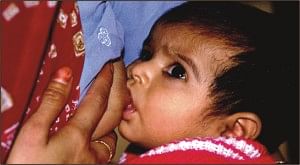Is my baby getting enough breast milk?

Human breast milk is the best food in the early days of life. Parents want to give their babies the best. More than two decades of research have established that breast milk is perfect-most to nourish infants and protect them from illness. Breast-fed infants have lower rates of hospital admissions, ear infection, diarrhoea, rashes, allergies and other medical problems than bottle fed babies.
Exclusive breast feeding for the first six months of life is very important specially the colostrums (secretion from breast immediately after child birth) and after that weaning food may be added gradually. Breast feeding can be continued two years or more as the mother wishes.
Some mother say that they do not have enough milk and asks paediatricians to prescribe formula milk. Answer to this question is — if a baby passes urine more than 6 times a day, it means mother is having sufficient milk. Another parameter is weight gain. If a baby gains daily 15-25 grams, it indicates that baby is having enough milk from mother. So there is not need of formula milk at all.
The primary benefit of breast milk is nutritional. Human milk contains just the right amount of fatty acids, lactose, water and amino acid for human digestion, brain development and growth. Cows' milk contains a different type of protein that is good for calves but not for human infants.
Breast fed babies have fewer illness because breast milk contains enough antibodies from mother to protect from different illness. About 80 percent of cells in the breast milk are macrophages (the cells which kill bacteria, fungus, viruses). Breast fed babies are protected in varying degrees from a number of illnesses including pneumonia, bronchiolities, bronchitis, botulism, staphylococcal infection, influenza, ear infection, measles, german measles, diarrhoea etc.
A breast fed babies digestive tract contains large amount of Lactobacillus bifidus, a beneficial bacterium that prevents the growth of harmful bacteria. Breast milk comes straight from the mother. As such it is sterile and there is no chance of contamination. But feeding from bottle is always having a chance of contamination and thus diarrahoeal diseases are common in bottle fed baby.
Nursing breast milk has psychological benefit for both mother and child. The interaction and connection between mother and baby becomes stronger through breast feeding. Many psychologists believe that nursing baby enjoys a sense of security from the warmth and presence of mother specially when there is skin to skin contact during feeding.
Nursing is also a nature contraceptive, although not very reliable. Frequent nursing suppresses ovulation, making it less likely for a nursing mother to menstruate, ovulate and get pregnant.
Most of our people are poor. They are not able to buy foods to feed their babies properly. In this case breast milk has a great economic value also.
Many times mothers are afraid of giving milk to their baby as they are taking some medication. Consult your physician about the drugs when you are nursing. Besides these, nursing mother should avoid bad habits like smoking and alcohol intake.
Breast milk is a dynamic fluid that changes in composition throughout the day and throughout the course of lactation.
In short, we can say that breast milk is ideal, economic, sterile, protective, nutritious God gifted food for the baby. We all should promote, protect and support breast feeding.

 For all latest news, follow The Daily Star's Google News channel.
For all latest news, follow The Daily Star's Google News channel. 



Comments